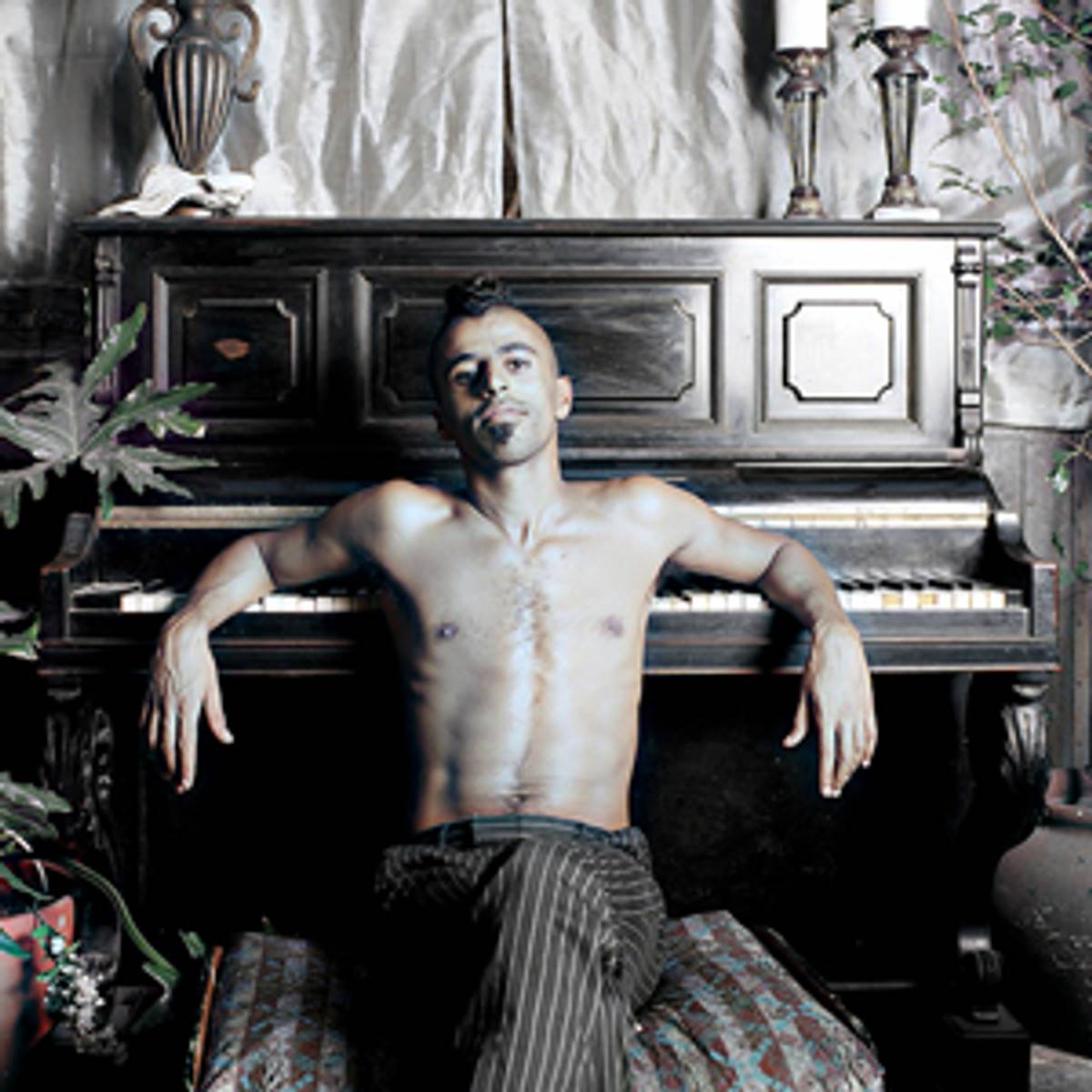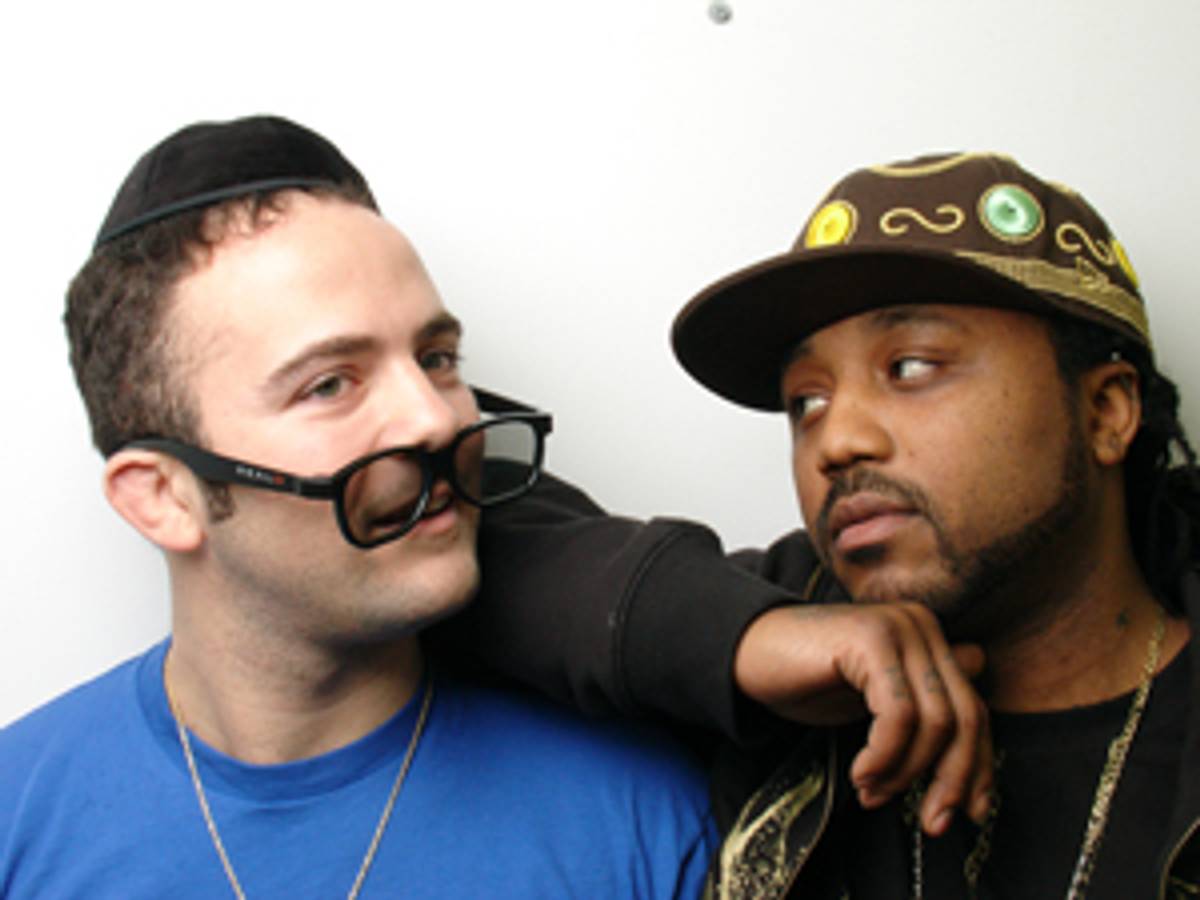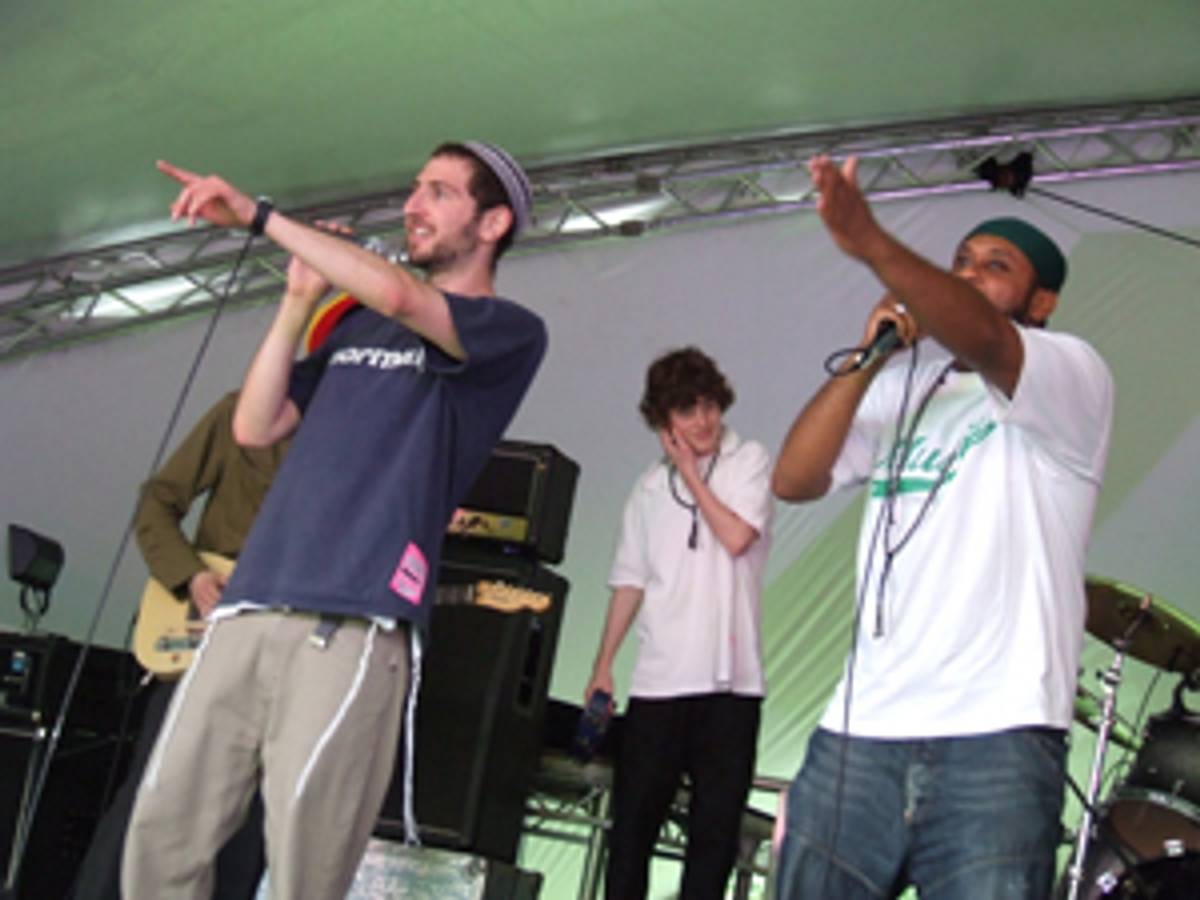When I first got into Judaism (read, betrayed my secular family and Conservative synagogue and became a religious zealot) I was convinced that Jewish culture was never going to replace secular culture in my life. During some of my first Shabboses as an observant Jew, I went to They Might Be Giants and Fugazi concerts, buying my ticket beforehand and manufacturing excuses, if only because, well, the Miami Boys’ Choir was next to impossible to slam-dance to, and I’d be damned if I was going to listen to any one-man synthesizer band just because we have a God in common.
As it turned out, the first Jewish band that I really paid attention to, a hard-jazz trio called Satlah, would be my prophets. I was booked to open for them doing spoken word, and as soon as I saw the front man, a trumpeter named Danny Zamir, wearing a white shirt and black slacks, the total Typical Yeshiva Guy look—I freaked, convinced his music would sound cheesy and Fiddler on the Roof-derived. Zamir had sworn off secular music, but the music he was making turned out to be radical, mindblowingly acidic, and full of punk-rock fervor—and it consisted entirely of traditional Jewish songs. Although I haven’t sworn off secular music, ever since that first night seeing Satlah, I no longer hold a prejudice against Jewish music. I went on to find deliverance in the form of Socalled, a Jewish musical historian who is also a hip-hop remix wizard; and Juez, the klezmer-jazz-garage punk band. I have also picked up some guilty pleasures from mainstream Jewish music: Moshav, who write damn good songs even if they are embraced by yeshiva girls and Phish fans; and Smadar, who might sound closer to Barbra Streisand than They Might Be Giants, but could also be Amy Winehouse in Yemenite diva dress. These discoveries may represent the only welcome result of Jewish hipsterification: bringing inventive and iconoclastic Jewish artists to the spotlight.
At heart, I’m still a punk-rock kid. I shop at independent record stores, I buy local produce, and I believe in the power of the local scene. And that’s how I see Jewish music: even when the bands are geographically disparate, something unites them. Maybe it’s that (maybe-outdated) idea of being Chosen; maybe it’s just my own taste. Either way, think of these as field notes from an emerging scene, a musical anthropology in action.
* * *
I have never been the biggest fan of Balkan Beat Box, JDub’s all-star international dance-music collective. Live, they’re a surge of energy and manic fun, but their albums feel DJ-driven and inorganic, too beat-centric and devoid of actual songs for me.

Enter Tomer Yosef, BBB’s MC, who just released his solo debut, Laughing Underground, on JDub Records. The record takes Balkan’s culture-jamming, dance-music, party-on-the-fly aesthetic and highlights the best parts of it: it’s catchy, quirky, and laced with pure pop sensibilities. Hebrew hip-hop hits you from one direction. Arabic nigguns come flying from another. It doesn’t sound like a Balkan Beat Box album; it sounds like half a dozen albums. What JDub doesn’t want you to know: Laughing was recorded back in 2004. Why it doesn’t matter: The 14-track album is fast-moving, manic, pulling influences from reggae, ska, hip-hop and even the ABBA songbook to make a good-natured party record that sounds like a greatest-hits mixtape for an irresistibly catchy band.
“Don’t Fly” is a great reggae song to play for people who don’t like reggae, but, for the truly selective, “Underground” is exactly what James Brown’s band would sound like if it was fronted by M.I.A. after inhaling helium.
Listen to “Don’t Fly” by Tomer Yosef
Listen to “Underground” by Tomer Yosef

Last week, the suddenly-ubiquitous Kosha Dillz released his first full-length album, a team-up with C-Rayz Walz called Freestyle Vs. Written. Dillz, an Israeli-raised yeshiva dropout, was discovered by Matisyahu, who loved his flow and turned him on to Judaism. Walz isn’t Jewish, but keeps getting teamed up with Jews (most notably on Socalled’s ode to Jewish cowboys “You Are Never Alone.”) There’s a gem in almost every line they drop, and the duo frequently embark on creative and hilarious tangents. The album’s conceit (one writes the bones of a song; the other freestyles) and the nth Jew reference can be tedious, but Dillz can freestyle endlessly on just about anything, and Walz waxes maddeningly clever about whatever subject he’s sent.
Listen to “You Are Never Alone” by Socalled and C-Rayz Walz
There’s a long and hallowed tradition of artists attempting to get out of press junkets, and Tamuz Shiran may have taken it to its extreme: after releasing her moody, quick, and quirky debut EP, Ten Moons, she left for a three-month silent retreat in the middle of nowhere. Shiran, a singer and guitarist with a classical aesthetic and a folk palette, suggests what might have happened if Judy Collins, instead of stumbling across Greenwich Village in the 1960s, wandered onto the neo-Hasidic hippie scene in Nachlaot, Jerusalem, circa last summer.
The first song, “Pitchu Li,” takes its cue (and its lyrics) straight from the prayerbook. Musically, it’s almost operatic. Her voice and guitar trade lines and there isn’t much in the way of bombast, overdub, or instrumentation; but, when the song fades to a whisper, I could have sworn I remembered a string section pulling its muscles on the denouement.
If you just listen to one song, though, make it “Moonsong,” a snappy, tiny Cat Stevens-influenced a capella song that ducks in and then out like a pixie. Oddly sandwiched between the two most overtly liturgical pieces on the album (“Min Hametzar” and the aforementioned “Pitchu Li”), the song is a charming nonsense rhyme, belted out by a one-woman barbershop quartet.
Listen to “Pitchu Li” by Tamuz Shiran
Listen to “Moonsong” by Tamuz Shiran

There are whisperings of a new collaboration between London-based rappers Anomaly MC, whose mother calls him Daniel Silverstein (and who’s an Orthodox Jew), and Mohammed Yahya (who’s an observant Muslim). The two have been jumping on each other’s songs for years, trading off tag-team choruses that blur the lines between cutesy, kitschy, and politically incendiary. But with Anomaly’s recent departure from his old band, Emunah, the two are pumping out tracks like nobody’s business, uploading some to their MySpace page, and tucking others away for the inevitable album.
Musically, Silverstein and Yahya’s beats take a cue from 1960s Motown via 1990s hip-hop, with a nod to King Britt in one direction and to Digable Planets in another. As for their lyrics—of course, there’s the requisite come-together song, and laments about violence and stumbling toward cultural understanding. But, more often, Silverstein and Yahya shy away from high moral ground, preferring instead to indulge in existential questions about God and getting in touch with their own heritage—“I study scriptures like my LiveJournal,” Yahya announces on “Yearning for Home.” (And, lest you think the Muslim-Jewish thing is only a front for two kids and a studio, their backing band includes musicians with names like AshleySayed Abd El Gawad playing bass, and “The Tzadik” on clarinet.) In a project like this, it’s a very narrow path between saccharine sentimentalism and pissing off everyone in the universe…and, so far, Yahya and Silverstein have been right on course.
* * *
Think of this column not as a laundry list of everything new in Jewish music, but as a broadcast from a basement rock festival. What I really want to do is take that five-years-ago me, the pre-Satlah me, slap his face a couple times, force him to listen to Jewish music without pretense, and show him just how good it can be. Maybe I can save some of you the trouble.
Matthue Roth is a performance poet and author of the novel Losers. He is an associate editor at MyJewishLearning.com.